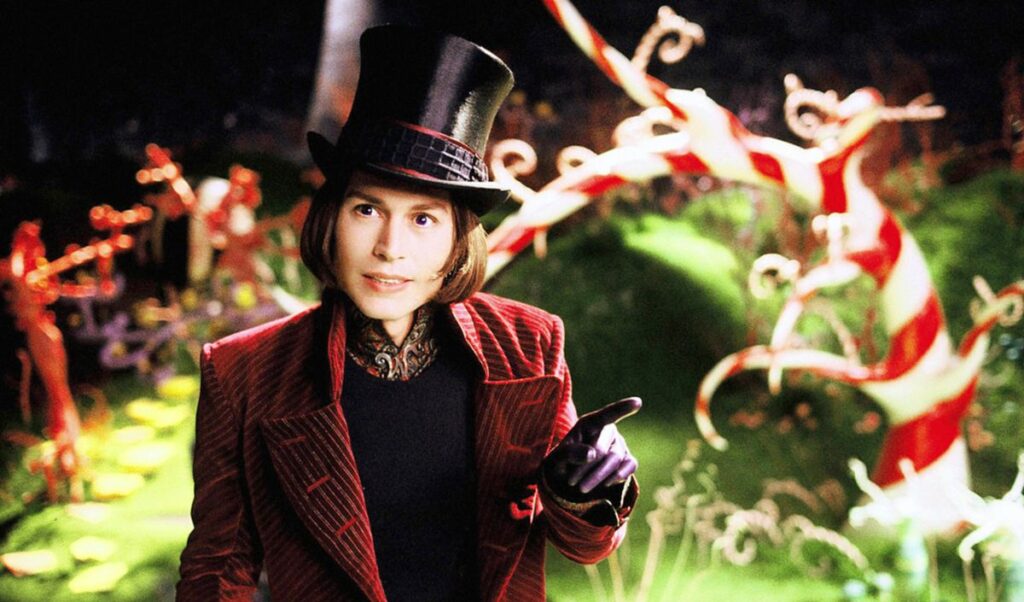“Hеre is the child that you left behind. Here is the kid with the curious mind. Here is the wonder we used to feel, back when the magic was real.” These are lines from “A World of Your Own,” a song performed late in Wonka, the 2023 movie starring Timothée Chalamet as a young version of Roald Dahl’s eccentric chocolatier Willy Wonka. The song keys into a frequently stated motivation for this movie’s version of the character: He wants to use his candymaking magic to create a feeling of childlike wonder in his customers, and indeed, the whole world.
That’s what Wonka director Paul King and his Paddington 2 writing partner Simon Farnaby want, too: to conjure the magic of Dahl’s children’s book Charlie and the Chocolate Factory, and perhaps more so, the 1971 film Willy Wonka & the Chocolate Factory, the most beloved adaptation of the book so far. But while this desire to commune with the spirit of the 1971 film may move nostalgic audiences, it also further underlines a truth about the three big Wonka movies so far: Tim Burton’s 2005 movie Charlie and the Chocolate Factory is the only one of them that really gets the material right — and that actually nails the character of Willy Wonka.
This sounds like sacrilege, mainly because Gene Wilder’s performance in the 1971 movie is wonderful, and deservedly adored. By contrast, Johnny Depp’s 2005 interpretation of the character as a pinched, condescending recluse is already off-putting even before you delve into how Depp’s long-beloved eccentricities have been recontextualized in recent years. (Dahl himself has also been reevaluated over the years, so that sort of discomfort doesn’t necessarily go away if you ignore Depp.)
Image: Warner Bros./Everett Collection
But Depp and Burton capture something crucial about Willy Wonka: the sense of a creator enamored of his own world, regardless of how he comes across to those outside of it. Part of what’s so compelling about Wonka in Dahl’s book is the brusqueness of his enthusiasms. He has an artist’s stubborn vision of what his audience will and should enjoy. His desire to make a better class of candy is almost militant.
That attitude informs his tacit view that the children on the tour of his factory deserve the various mishaps that befall them, because they’re spoiled, greedy, impulsive, and so forth. Readers are expected to agree, because we get a closer look at their backstories and pathologies. Wonka doesn’t have all of this information at the outset; he casually and confidently intuits their rottenness as only a childless loner can.
His nonchalant acceptance of their fates has less to do with an exacting moral calculus than with how they defy his particular sensibilities and rules, which he hopes children will follow attentively and instinctively. This is its own form of fantasy — the idea that a child might abide by abruptly introduced rules with little additional instruction or prodding. Given the low likelihood of any given child immediately understanding how to behave in a new environment, parents should recognize the punishments faced by Augustus Gloop, Veruca Salt, et al. as both outsized and darkly satisfying.
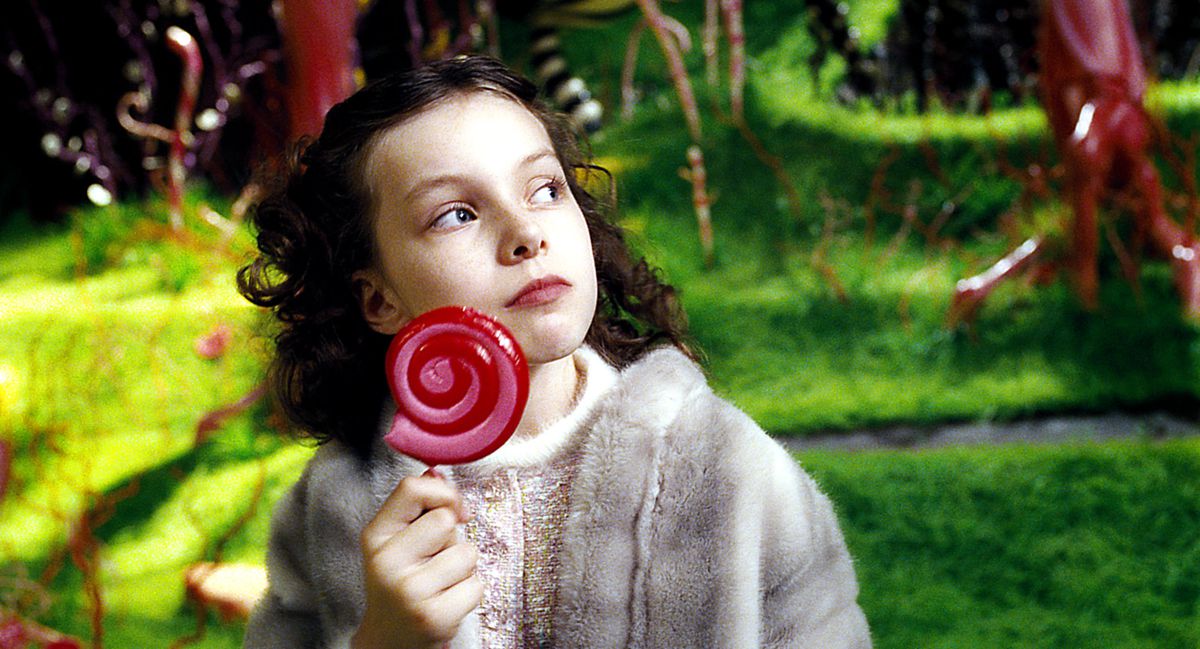
Photo: Warner Bros./Everett Collection
Depp, bringing in his own set of bizarre mannerisms from outside Dahl’s pages, excels at highlighting this artistic-engineer myopia, making his hostility toward children (and humans in general) seem more organic than it does in the other movies. Depp’s Wonka, befitting a Tim Burton character, has turned his personal whimsy into a shield from the rest of the world — and at times, a weapon. His vision for advanced sweets-making requires both wonder and deference; his candified wonderland functions best without the participation of unruly outside visitors.
As such, Burton’s introduction to the character suggests that, at least at the beginning of the movie, the reclusive Wonka is his own ideal audience. When it’s time for him to meet his contest winners, he fires up a technologically impressive but somewhat demented animatronic puppet show, trilling a ditty in tribute to his own genius.
And instead of appearing onstage on cue at the song’s end, he sidles up to the other viewers, applauding after his creations catch fire and melt. When a child asks why he isn’t part of the show, he blithely responds that he wouldn’t be able to see it from the stage. Maybe he needs to be in the audience because he needs to know someone there will be on his wavelength — even if that person has to be himself.
By making Wonka’s ego so explicit, Burton and screenwriter John August extrapolate some additional psychology from behavior that’s more of a running gag in the book, without sacrificing the character’s comic potential. (His evasiveness is maddening and opaque to literal-minded parents, which is surely part of the character’s appeal to kids.) Depp foregrounds Wonka’s remove from polite society with a hilarious lack of cuddliness, from his constant claims that he can’t hear or understand any protests he’d prefer to ignore (a detail taken directly from Dahl’s text) to his barely contained physical revulsion when a child dives in to hug him.
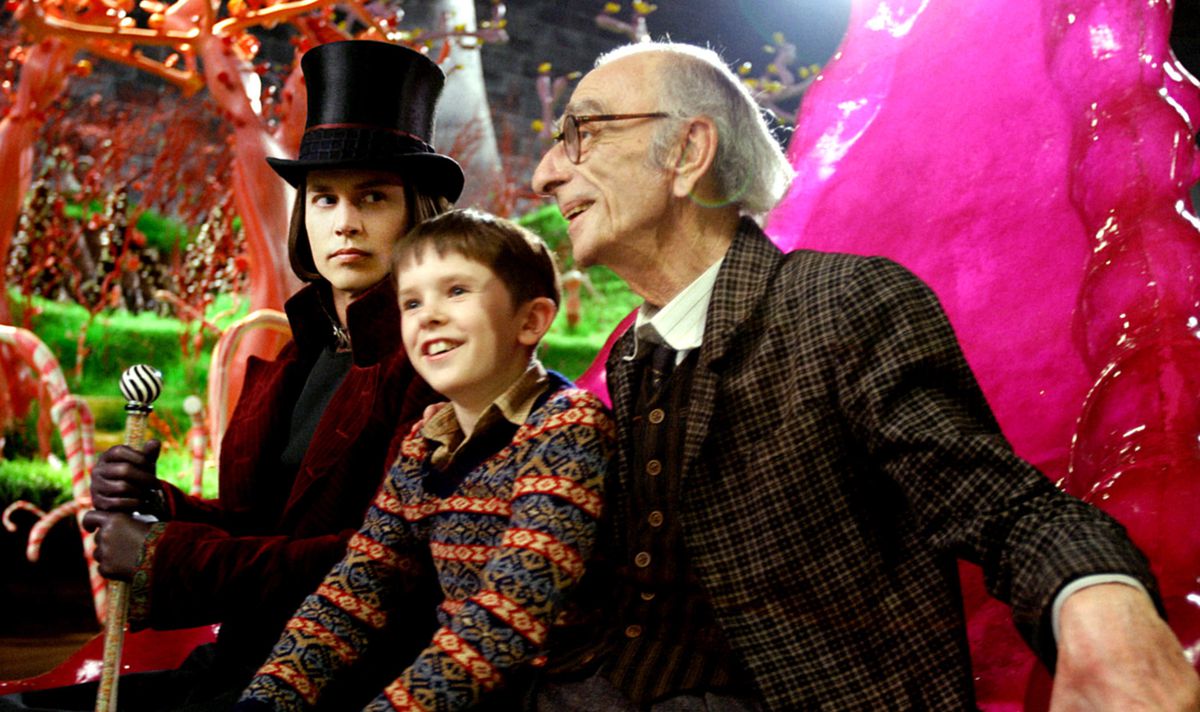
Image: Warner Bros./Everett Collection
In contrast with the sentiments of the moony “Candy Man” song from the 1971 movie, engineering candy that children love does not make Willy Wonka a nice person. In the Burton movie, it’s Charlie’s dedication to his own family that eventually inspires Wonka to soften, however slightly.
That’s an addition to the novel, and not an especially inventive one — but at least the tacked-on character growth in Burton’s movie signals an understanding of the compelling paradox at the center of Dahl’s character. Willy Wonka is the architect of children’s wildest fantasies, but he considers himself such an expert that he barely feels the need to consult with humanity at large to fulfill them.
Burton and August may have felt this expansion of the book was necessary because Dahl presents Wonka as a supremely confident man who’s content with himself, and doesn’t go through any defining, life-changing arc. In fact, many of Dahl’s most memorable characters are relatively static, often a source of comedic or dramatic friction when they come up against difficult people or situations.
That’s something King’s 2023 Wonka movie gets right about Dahl’s book, however accidentally. Chalamet’s Wonka begins the movie as a starry-eyed dreamer, briefly experiences a few moments of doubt and hesitation at the prescribed three-quarter mark, and ends the movie with his starry-eyedness fully vindicated and intact. His whims have no prickliness or harder edges, though. Chalamet plays him as innocent, openly daft, and a self-described magician.
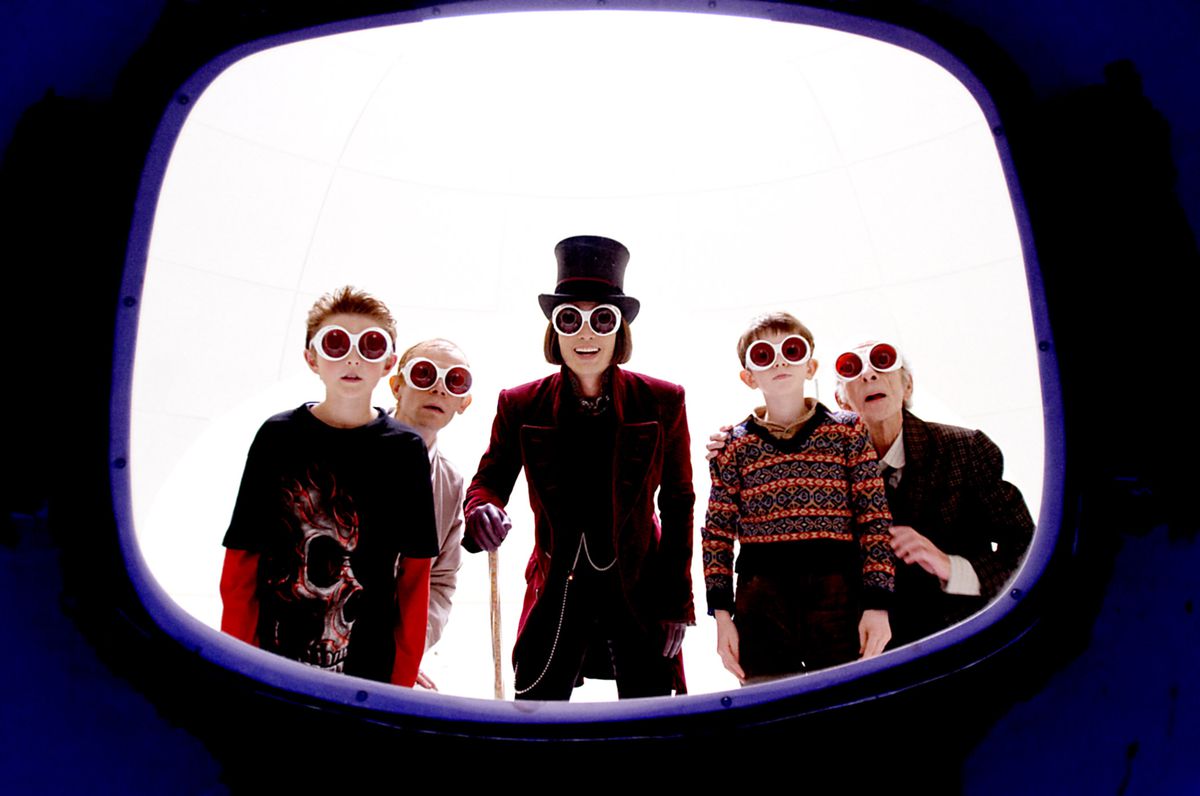
Image: Warner Bros./Everett Collection
But most magicians work with some element of concealment to lend their tricks some kind of mystery or tension, something King largely ignores and Burton embraces. The 2005 Wonka has plenty of concealment, both visual (he dons goggles and gloves, seemingly recoiling at the touch of other people) and behavioral. There’s tension between the image of a benevolent candymaking genius and the strange, sometimes remote human underneath.
This prickliness and ambiguity is present in Wilder’s performance, too, right from his famous introduction. Wilder himself came up with the idea that Wonka would enter the movie seemingly enfeebled, walking with a cane, and then somersault with unexpected dexterity in front of the gathered crowd, illustrating both his showmanship alongside his capacity for deception. The movie around him, however, doesn’t always live up to Wilder’s performance the way Burton’s sweet-and-sour psychedelia syncs up with Depp’s.
Burton’s movie has a more overtly stylized and fantastical look than the 1971 version, even before the Wonka factory reopens its doors. The wintry desolation of Charlie’s dilapidated family home creates an eventual visual contrast with the vast spaces of Wonka’s factory interior, depicting two different forms of loneliness: Charlie’s economic isolation from a more comfortable life versus Wonka’s self-imposed exile. The pre-Wonka section of the 1971 film, meanwhile, smooths over many of the novel’s rougher bits — Charlie’s extreme poverty, especially — with flat acting, some amusing but distracting gags added for the movie, and cheaply sentimental songs.
The early film is remembered as a classic largely because Wilder consistently, expertly cuts through its treacle. Warbling the Carpenters knockoff “Pure Imagination,” he punctuates the lines with staccato swings of his cane, abruptly halting his visitors at unexpected intervals. By the end of the movie, though, Wilder’s Wonka implies that he always had faith that there was a child out there somewhere who was purehearted enough to inherit his magic. In this context, Wonka’s oddities (and some great sequences, like the famous boat-trip freakout) are more of a sideshow curiosity than the full worldview of Burton’s film — a weakness in the writing, not Wilder’s performance, but a limitation all the same.
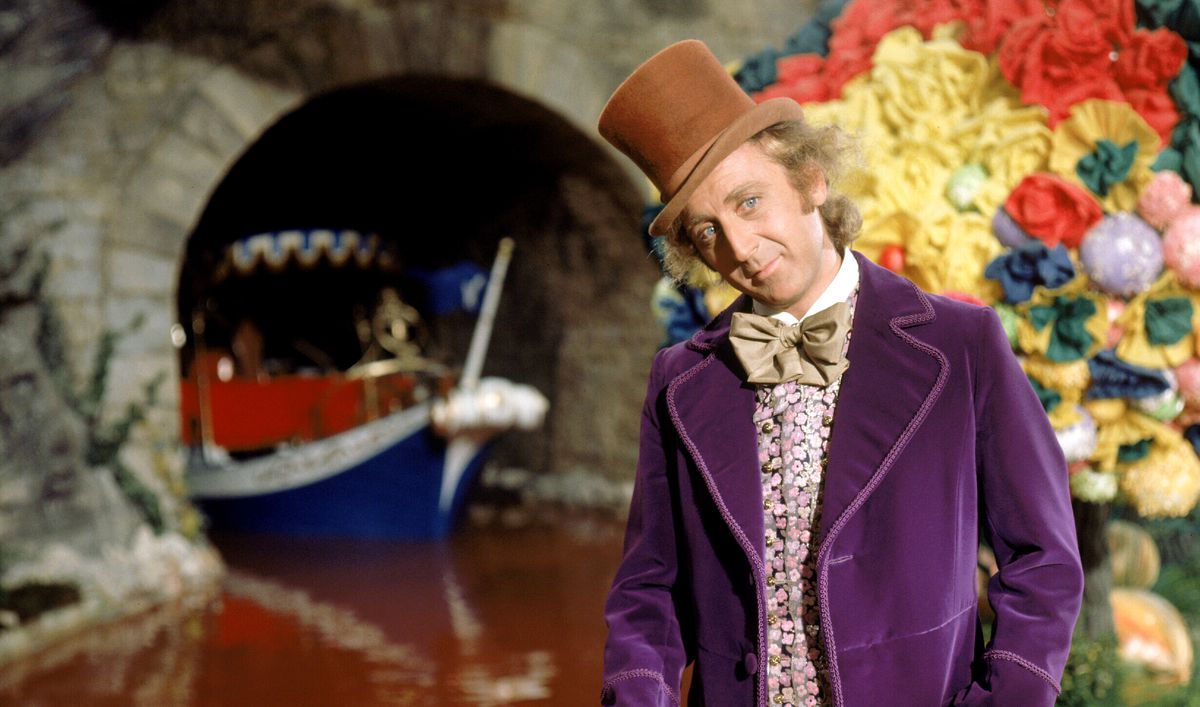
Image: Paramount Pictures/Everett Collection
Paul King’s Wonka in turn borrows accessories from the 1971 film: the songs, the iconography of Wonka’s coat and top hat, certain famous lines of dialogue. It makes more sense than forcing Chalamet to imitate Wilder’s charmingly menacing performance style directly, but less sense than having the character in any way resemble Willy Wonka as Dahl wrote him.
The best that can be said of Chalamet and King’s version of Willy Wonka is that it doesn’t knock off Wilder or Depp. Instead, it plays up the character’s flakiness and pursuit of childlike wonder. There’s no sense of calculation to this Wonka. Even his showmanship — the quality that makes the Wilder and Depp versions so unpredictable, albeit in very different ways — has a welcoming, inclusive warmth.
These are admirable qualities. Among the three Wonkas, Chalamet’s is easily the one who’d make the nicest friend in real life. He’s also by far the dullest of the three to actually watch. Even on the movie’s own terms, separated from how it works as a Dahl adaptation, his Willy Wonka isn’t strange, funny, or charismatic enough to complicate his hoary motivations and unrelenting goodness. (He makes chocolate in tribute to his dear, departed mother!)
More importantly, that hybrid world of Burton and Dahl stands on its own, rather than depending on pop-cultural recognition. It’s harder to take the guy in Wonka as his own person, because he’s stuck in a movie so deeply and self-consciously obsessed with the magic of the 1971 film. In its way, Wonka is as shameless as Ghostbusters: Afterlife in sentimentalizing a tartly original story.
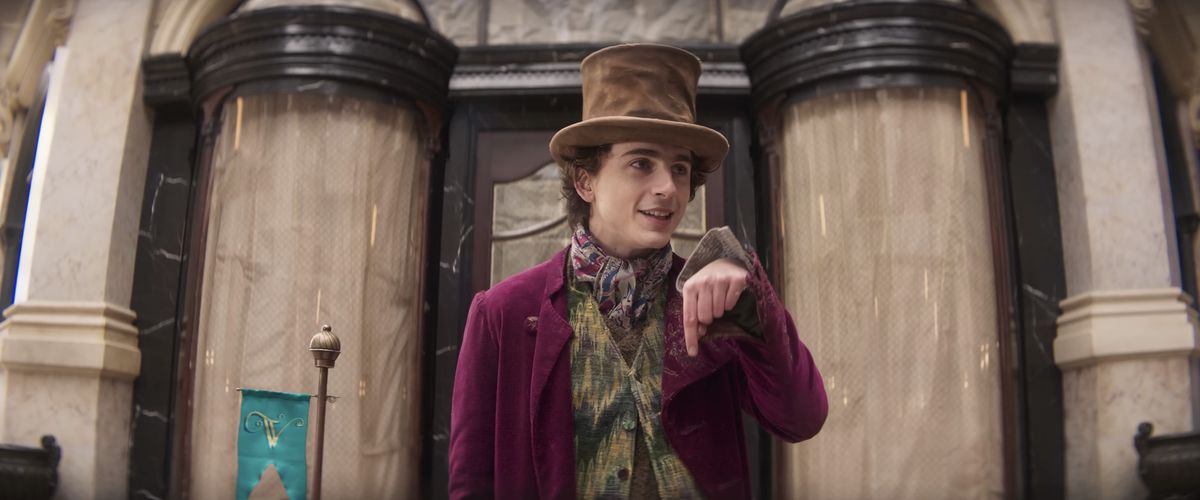
Image: Warner Bros. Pictures
Continuity matters less than what Wonka actually says and does — particularly by turning Dahl into a Broadway revue, with details that superficially echo his other books. There are moments that recall characters and actions from Matilda, The Twits, and George’s Marvelous Medicine, but not Dahl’s wryly matter-of-fact tone. Tellingly, despite all the Willy Wonka nostalgia, no one has bothered to adapt Dahl’s actual sequel novel Charlie and the Great Glass Elevator to the screen; it can’t be reshaped into a touching underdog story.
To be fair, Dahl’s lack of sentimentality, love of language, and fondness for child-pleasing grotesquerie make him a deceptively tricky author to adapt. So far, Wes Anderson has been the filmmaker best suited for the job, with his successful feature-film version of Dahl’s short novel Fantastic Mr. Fox and his distinctive adaptations of his short stories for Netflix. Burton’s Charlie is a bigger, more blockbuster-oriented spectacle than Anderson’s work, and compromised in some respects, but it’s closer to Anderson’s unsparing approach than Paul King’s oppressive attempts at ingratiating brand management.
In other words, Burton’s Charlie and the Chocolate Factory isn’t overly concerned with “the child you left behind,” as those Wonka lyrics go, or rhapsodizing about a time when magic was real, or hyping up a world of pure imagination. Burton and Depp’s Wonka exists outside of dead-end nostalgia, and his self-regard keeps the movie from getting too gooey. In the film’s best moments, it’s about the hard work of an artist relating to humanity, in whatever small doses he can stand, so he can continue innovating and creating while holding on to his eccentricities. It’s easy to imagine how Roald Dahl might relate to that.

